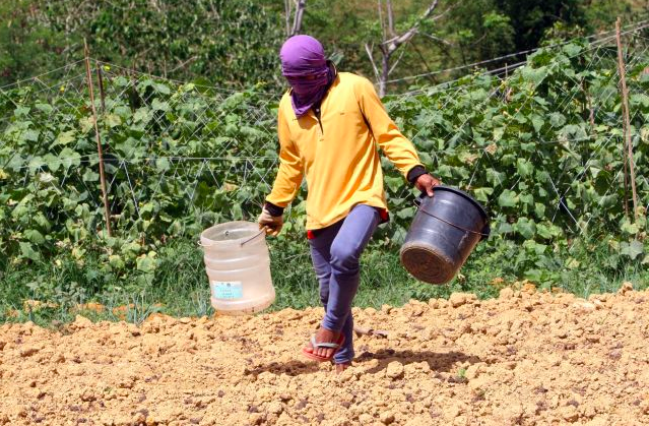
A farmer from Cebu fetches water to water his crops. |CDN file photo
CEBU CITY, Philippines — The Cebu City government will control the distribution of water drums and hoses among the 28 upland barangays based on the needs of each area.
Councilor Alvin Arcilla, Committee on Agriculture chairman, said this to maximize the resources of the city in helping the farmers who had been affected by the El Niño.
Arcilla told Cebu Daily News Digital that the city, through the City Agriculture Department (CAD), would have to make sure that the drums and hoses would be received by those who would need them the most.
“Dili man sad tanang barangays sa uplands wala na gyoy tubig. Didto sa mga northern upland barangays, medyo mas worse ila situation, sila ato ifocus,” said Arcilla.
(Not all upland barangays have no water. However, in the northern upland barangays, the water situation is worse than the other upland barangays. And so, those are the areas that we will focus.)
Read more: City Council places Cebu City under state of preparedness for El Niño
Farmers organizations will facilitate the distribution and request the number of drums and hoses needed for their areas of the barangay.
Once the CAD has assessed the needed number of drums and hoses, they will be released to the farmers.
“In that way, makita nato if nasobraan og pangayo ang usa ka area, mahatag nato sa ubang areas nga mas nanginahanglan,” said Arcilla.
(In that way, we can determine if a certain area has requested too much of the drums and hoses, so that we can give those drums and hoses to those who need them the most.)
Arcilla said that the city has long been preparing for the El Niño and has come prepared for the expected “harsher days.”
Read more: El Niño damages P4.6 M crops in Cebu City farmlands
The P12 million allotted for the El Niño has been partly used for the purchase of the drums and hoses, and some livestock including pigs and goats to give the farmers alternative sources of income for free.
“Two weeks ago, nanghatag na tag mga baboy ug kanding sa ubang farmers para naa sad silay laing panginabuhian. If manganak ni ilang baboy or kanding, ila pud ni ihatag ang baktin o kanding ngadto sa lain,” said Arcilla.
(Two weeks ago, we distributed pigs and goats to some of the farmers so that they can have an alternative livelihood. However, once their pigs or goats will give piglets or kids respectively then they also should give them to other farmers.)
Arcilla said that the farmers had also been educated fairly on agriculture and had prepared their own farmlands by planting on crops that would consume less water such as maize and pepper.
However, he said with the P4.6 million worth of damage just for the month of March, he understood that some farmers had stopped farming for a while to let the El Niño pass.
“Kahibawo na gyod na sila mao na ang uban dili nalang usa mananom arong panahona,” said Arcilla.
(They know the effects of the El Niño. That is the reason some of them have stopped planting crops at this time.)
Arcilla said he hoped that the El Niño would not discourage the farmers since the local food source of the city could only feed 20 percent of its population.
“Nagkuwang gyod tag mag-uuma. Mao na mahal kaayo ato pamalitunon kay mag-angkat pa ta gikan sa probinsya,” said Arcilla.
(We lack farmers. That is one of the reasons that the prices of the produce from the farmers of the province have gone up.)
To encourage farmers, the city has created programs such as the Farmers market every Fridays at the Plaza Sugbo which allows farmers to sell their goods directly in the city without middlemen gaining most of the profit.
The city has also partnered with Gaisano supermarket, which now goes to the upland farmlands on a weekly basis to buy the produce of the farmers directly from them, cutting down the cost for transportation from these farmers.
Arcilla encouraged the farmers to join the Farmer’s Federation so they could be accounted for by the city in times of calamities such as the El Niño.
“Naghope lang gyod ta nga makalingkawas ta aning kainit,” said Arcilla./dbs